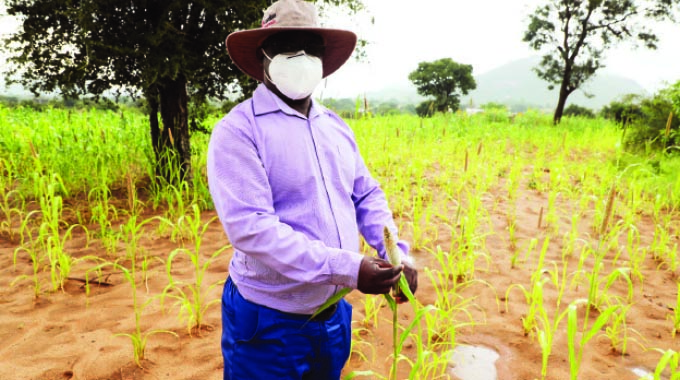
Rumbidzayi Zinyuke
Manicaland Bureau
Farmers in Buhera district are pinning their hopes on the crop planted under the Pfumvudza programme to improve their yield after the majority of the conventional crop was destroyed by the recent heavy rains.
The Pfumvudza concept was adopted to address the problems of low productivity and low profitability in farming, which was affecting food security.
The Government is targeting over 1,8 million households to produce 1,8 million tonnes of cereals and over 360 000 tonnes oil seeds under the Pfumvudza concept.
This season, Buhera has received its highest rainfall in decades, which would have ordinarily improved the expected yield significantly.
However, the above normal rains have had a negative effect as it has resulted in leaching and water logging in many areas, thereby destroying part of the crop.
The crops grown under the Pfumvudza concept are in good condition and will resultantly be the pivot of the district’s food security situation.
“We have received good rains this year but that has damaged some of our crops.
“I have written off almost all the maize that I planted when the season began in October because the rains have been too much.
“Most farmers are in the same situation.
“Those who were part of the Pfumvudza programme will definitely have a better crop than those who ploughed,” said Mr Webster Mvenge from Ruwinga village in Buhera West.
Mrs Teurai Usavi said even the traditional grains that had been planted under the conventional method had seriously suffered.
“Most of the crops, both maize and traditional grains that we planted after the first rains were destroyed.
“Only those planted in Pfumvudza plots survived and we are expecting to get a good harvest from that,” she said.
Buhera district Agritex officer Mr Simbarashe Sedeya said the Pfumvudza practice had many advantages in the naturally dry region prone to droughts.
He said farmers, particularly those that had access to mulch, were in a much better situation than the rest of the farmers in the district.
“Buhera has sandy soils so due to the heavy rains we experienced leaching in some areas and the crop didn’t do well.
“Those who joined the Pfumvudza programme are better off. With Pfumvudza, the farmer can retain moisture for the crop and soil erosion is very low.
“Also the split application of fertilisers where top dressing is placed where it is needed is also helping keep the crop healthy.
“In most areas where they planted using ploughs, the heavy rains have washed away the top soil and fertilisers,” he said.
He said Buhera had this year received average rainfall measuring 450ml compared to about 300ml received in the past.
Buhera District Development Coordinator Mr Freeman Mavhiza said many farmers were now in need of more top dressing fertiliser to redeem their crops.
“Crops were affected by leaching and this will compromise the harvest that they were likely to realise,” he said.
“Even the traditional grains that do well here were affected and the farmers need to keep applying fertilizer but that will be challenge for many.
“However we are still hopeful that the upper part of the district, the situation is still good and they will get more food.”
